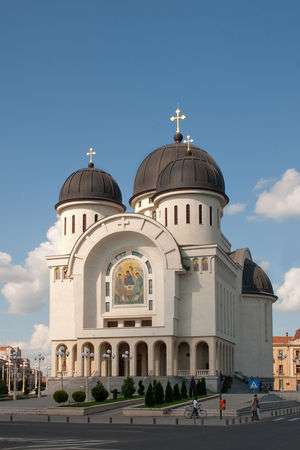Holy Trinity Cathedral, Arad
Coordinates: 46°11′0.94″N 21°19′29″E / 46.1835944°N 21.32472°E
| Arad Orthodox Cathedral Catedrala Arhiepiscopală din Arad | |
|---|---|
|
Arad Orthodox Cathedral facade. | |
| Basic information | |
| Location | Arad |
| Affiliation | Romanian Orthodox Church |
| Rite | Eastern Orthodox |
| State | Romania |
| Ecclesiastical or organizational status | Metropolis of Banat |
| Status | Archdiocesan cathedral |
| Architectural description | |
| Architect(s) | Ioan Hăprian |
| Architectural type | Cathedral |
| Architectural style | Byzantine |
| Groundbreaking | 24 November 1991 |
| Direction of façade | South |
The 'Holy Trinity' Orthodox Cathedral (Romanian: Catedrala "Sfânta Treime" din Arad) is a Romanian Orthodox cathedral in Arad, in the Crișana region of western Romania. It is the main cathedral of the episcopal see of Arad, currently headed by Timotei, Archbishop of Arad.
History
The cornerstone of the new cathedral was laid by the bishop, Timotei in November 1991. Proper construction efforts started in 1992, when the work started on consolidating the ground and the foundation of the new church. Construction lasted until 2006, when the last exterior works were being made and the large front icon was completed.
Long before construction has ended, due to the specific of the church, bells were brought in from a foundry in Innsbruck, Austria. With a summed mass of 6.56 tons, respectively 4050, 1070, 745, 450 and 250 kg for the five bells, they were mounted in December 2003. In 2006 the cathedral had 4 golden crosses mounted upon its domes. The three small crosses measured 3,5 meters each and the large one was 7,30 meters high.[1]
Inauguration
On the feast of Saint Nicholas, in 2008, the cathedral was inaugurated by the Patriarch of Romania, Daniel. An impressive gathering of clergy and believers took part in the blessing of the church and its inauguration, as the moment marked the inauguration of two altars, one in the demisole of the cathedral, the secondary one and in the ground floor of the cathedral the blessing and inauguration of the entire cathedral and its main altar.[2]
